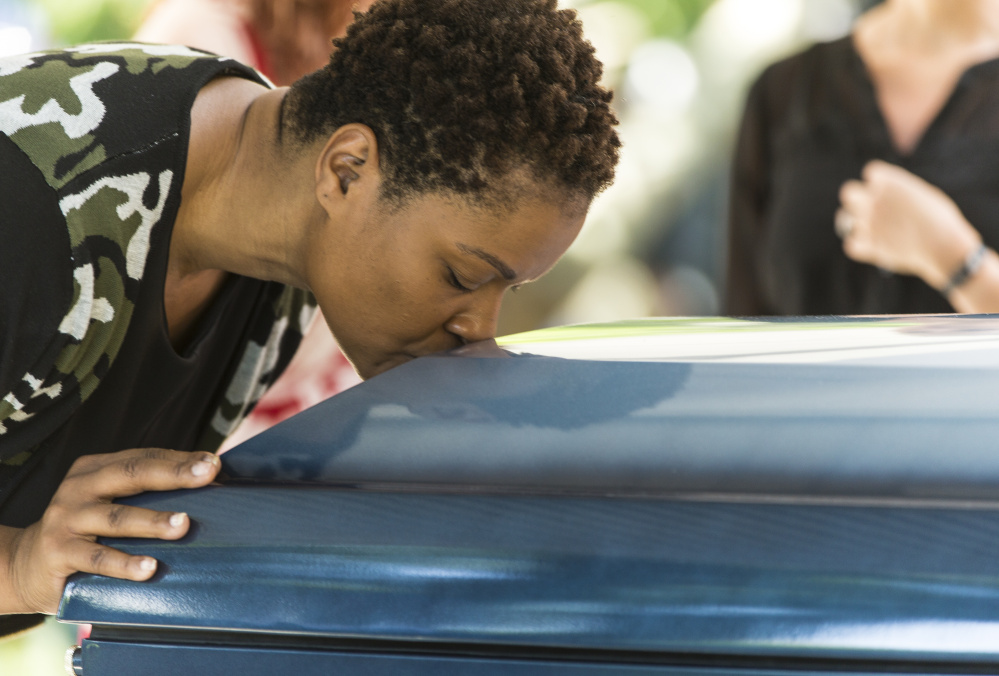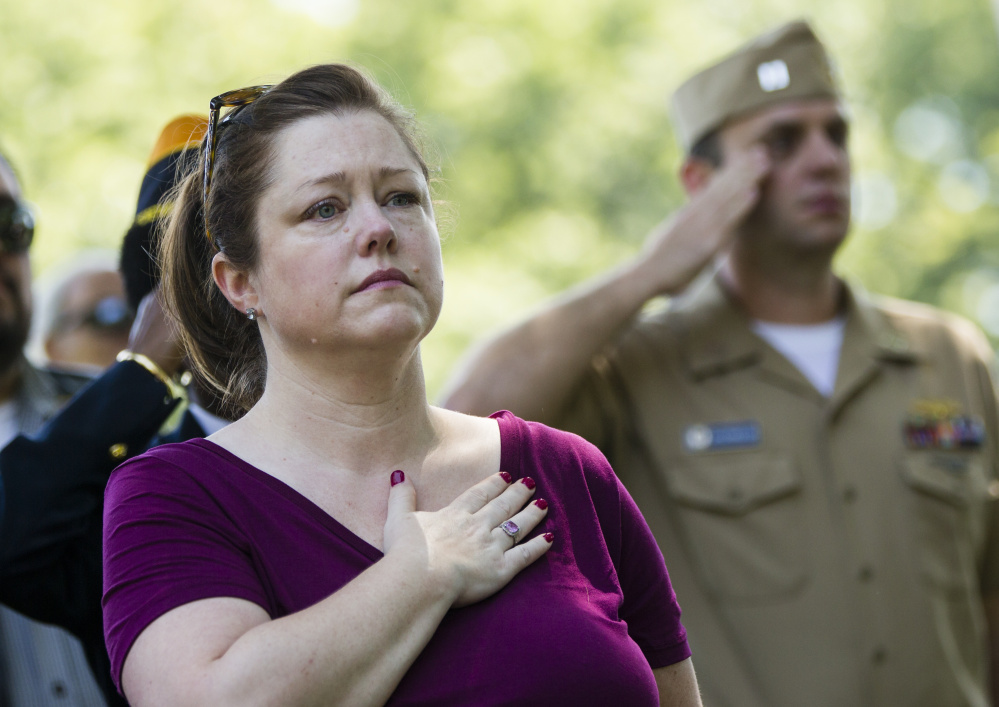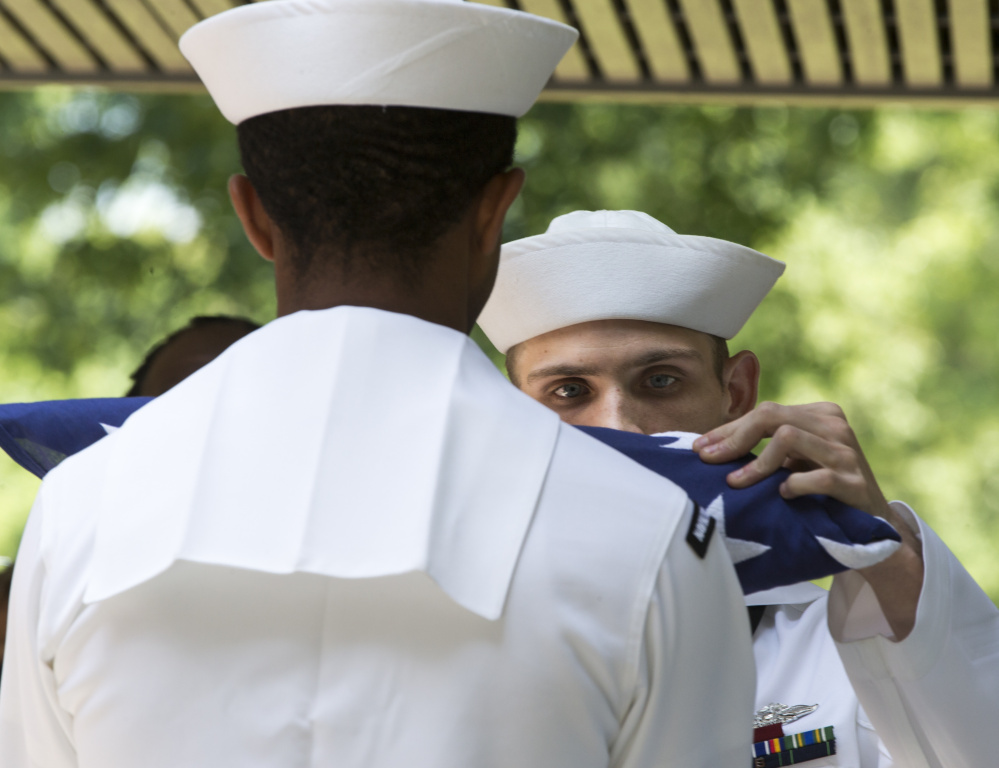A social media campaign leads 200 people to attend the funeral service of a woman they don’t know.
At the funeral, Jaspen Boothe introduced herself as Serina Vine’s sister.
She spoke of the deceased’s heroism as a World War II veteran. She bent down and pressed her lips to the top of the casket.
Yet Boothe, like the 200 or so others who came to pay their respects Tuesday morning, had never met Vine. She had only first heard about Vine a week ago, when she received a call that the 91-year-old homeless veteran with no known relatives was going to be buried at Quantico National Cemetery in Virginia with only four people in attendance.
To Boothe, herself a one-time homeless veteran, that was unacceptable.
She took to social media, posting in veterans groups, hoping to encourage a higher turnout for Vine’s funeral. She hoped she could get even 20 people to show up to give Vine the honorable goodbye she deserved.
Instead, when Boothe arrived at the cemetery, cars were backed up about a half a mile. She thought that there must be multiple events happening at that time. But no, they were all there for Vine.
“It was like a pinnacle moment to show how veterans come together for veterans,” Boothe said. “We are connected through our service and through our sacrifice. Look around now, she has 200 or so family members. As long as you’re a veteran you have friends and family everywhere and you’re never alone.”
Little is known about Vine’s life. She lived in the Department of Veterans Affairs’ Community Living Center in Washington since 1995, when she was found homeless on the streets and suffering from dementia.
It is known that Vine served in the Navy from 1944 to 1946 doing radio intelligence. William Jones, a retired Marine who works at Quantico, helped fill in some of the blanks. He received a call a week ago from a colleague, Katie Bryan, who took care of Vine’s finances as her appointed legal custodian. She was organizing Vine’s funeral and asked Jones to come and make remarks. “I said, ‘absolutely, but the problem is when I consider the dates she was on active duty, that makes her a World War II veteran,’ ” he said. ” ‘We have to do a better job than this.’ “
He spent the weekend digging through census data, military records and the national archives for anything more he could find out about Vine’s life. He discovered census records with her name from 1930 and 1940 that showed she was born in 1924, and he found that she graduated from the University of California at Berkeley in 1954.
The caretakers at the home said she spoke three languages and loved dressing up for church on Sundays. But Jones could not find anything about Vine’s life between college and when she was found on the streets of Washington, D.C., 21 years ago.
Jones contacted Boothe, who runs a nonprofit group for homeless female veterans called Final Salute, to ask if she would also attend and say a few words.
It was only four days between when Jones learned of Vine’s death and the funeral, but word spread quickly in that short span. Veterans from every branch of the military, of different ranks, race and gender, came out.
“For an hour, we all came together to pay respect to this woman who was homeless and served our country when there wasn’t many women serving their country,” Jones said.
A group of about 30 volunteers had arrived early to wave small American flags as Vine’s casket was carried from the hearse to her resting place. A Marine color guard performed the 21-gun salute. A bugler showed up to play taps. The American flag draped over the casket was folded into the traditional triangle and presented to Bryan, who had taken care of Vine and made all the funeral arrangements but also had never met her.
Bryan said she’ll keep the flag for six months to see whether any of Vine’s relatives hear about the story and want to have it. If not, she plans to donate it to the Women in Military Service for America Memorial.
At the funeral, Bryan said she just kept looking around in awe at the crowd.
“It was a beautiful sight to see for this person that no one knew,” Bryan said. “My whole intent was to give her the same time and respect that I would do for my own mother, from picking out a casket she would like with crosses on since she was an avid church-goer. If this is my mother, this is how I want her to be treated.”
Jones did say a few words at the funeral, borrowing, he said, a line from Boothe: “In the military we do not serve alone; therefore, we should not die alone.”
But the official eulogy was given by Dwight Michael, another Quantico colleague and a pastor, who brought several people in the crowd of strangers to tears.
In his remarks, Jones said, Michael started listing off names of World War II heroes. Then he said those heroes would have to move one seat over and give Vine a seat at their table.
Boothe, an Army reservist, lost her home in Hurricane Katrina just before she was about to deploy to Iraq, and soon after was honorably discharged when she was diagnosed with adenoidal cancer. She was jobless, homeless and a single mom. For Boothe, who has made her life’s work helping homeless female veterans, seeing Vine rightfully honored and not cast aside was incredible.
“Homeless isn’t a status. She’s a hero,” Boothe said. “She liked to go to church, and I hope she was smiling down knowing people did care and that she’ll be remembered. She won’t be an unknown.”
Send questions/comments to the editors.





Comments are no longer available on this story